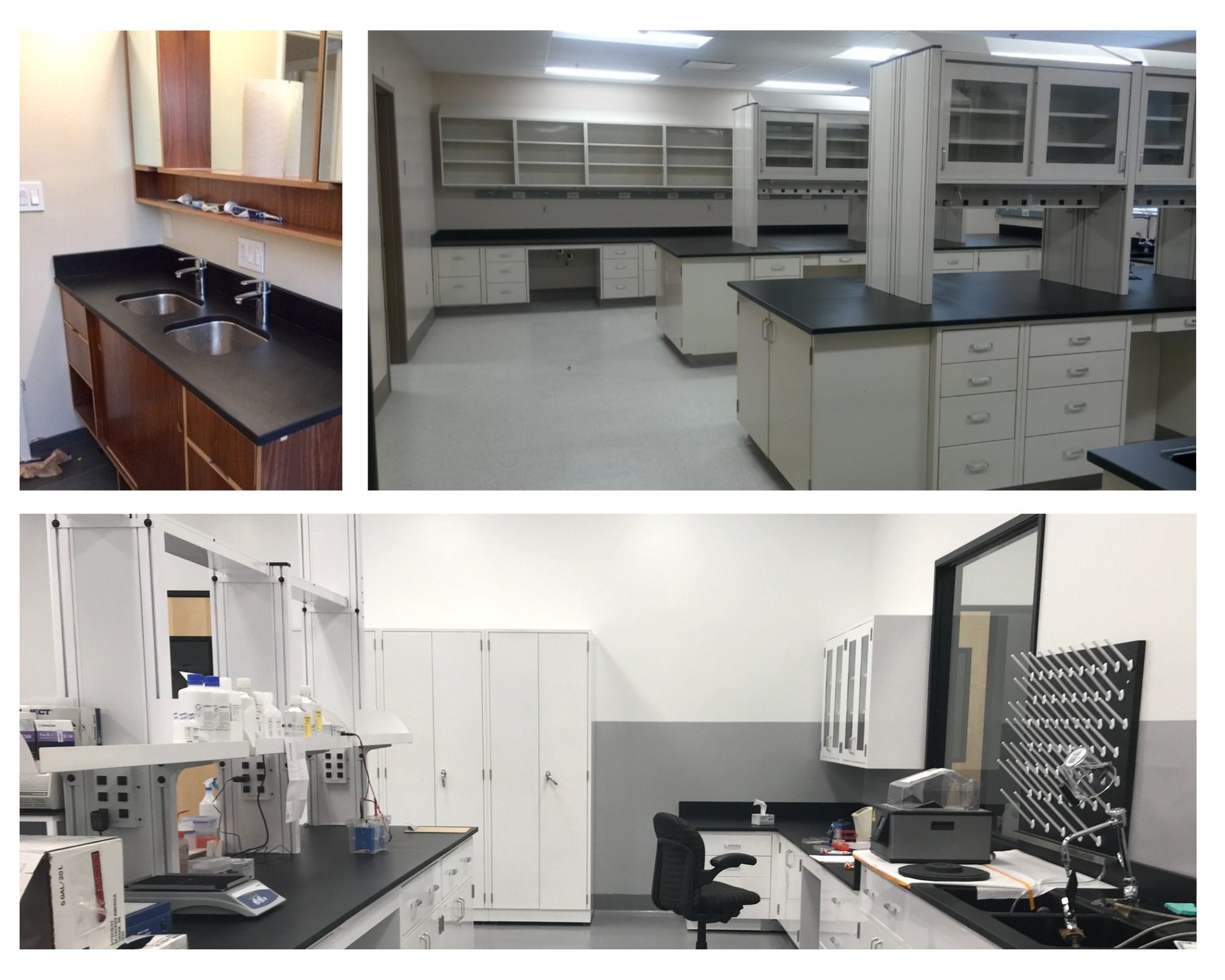Laboratory countertops are an integral part of any lab and thus, are crafted by professionals in a wide breadth of styles.
It is crucial to understand that the structural integrity of your countertop depends on how you have designed the installation process and upon choosing the proper type of support structure.
So why would you settle for low-quality countertops that will cause you problems in the future? The equipment placed on a countertop will determine its primary goal.
For example, research will require a countertop that can stand up to numerous chemicals. Labs and schools require a broad range of countertops to fit their purposes, so keep reading below to learn about the importance of countertop support.
Why is Countertop Support Vital?
The purpose of a support system is to control movement in terms of deflection or vibration. Not only must this attached support system carry all the weight of the countertop, but it must also effectively hold the structure in place and control any secondary motions that may result from high impact or unusual loads.
Construction has to be with support systems that prioritize ergonomics, durability, safety, and aesthetics. A well-informed choice must be made here, as mistakes in designing a countertop installation can lead to damaged or undesirable results later down the road.
How to Choose the Right Support System
Selecting the right countertop is arguably the most important decision you will make when building a lab. The top suggestions while designing your laboratory is that your countertop should offer:
- Aesthetics: Form and function should harmonize in the workspace—looks matter.
- Safety: Laboratories and other workplaces should be safe—this means hazard-proof countertops.
- Security: Who has access to what and when can affect the production process (and the bottom line).
Paying Attention to Weight
To choose the right countertop for your lab, you must first determine the type of support system you will be installing. Depending on the size and composition of your laboratory, select a countertop that offers durability, solidity, style, and practicality. All these factors depend on the weight of your countertop.
Laboratory countertops come in a wide variety of shapes, sizes, and styles. However, most of all countertops come in different weights—this means it’s important to make sure you have the right weight.
Overhangs
Overhanging and cantilevered countertops need support for the countertop. If the overhang cabinetry is cantilevered, it must be supported to prevent them from cracking or bowing.
Cabinets
Cabinets provide storage space for medical equipment and materials, such as microscopes, scales and lab furniture. They may also store sinks, faucets and other plumbing.
Somecabinets are freestanding, while others are attached to the ceiling or walls. Ensure you have cabinets built to support the weight of your countertop.
The Plumbing
Plumbing pipes usually lay on the underside of the countertop, while under-counter appliances have a drain system that connects to the facility’s waste pipes. It is imperative to ensure that all plumbing pipes and other associated supports are sufficient to support the countertop.
Types of Supports
The composition of each lab space is unique to its purpose. Laboratory countertops are designed to match several workspaces in a lab where frequent work with heavy and dangerous chemicals takes place. The Provision of proper infrastructure supports these workspaces.
Posts
A sturdy post is necessary to support all the weight and pressure from the equipment on top of it. An optional feature for these posts include holes on top of the footer section
that connect hardware to mount cabinets, lockers, and other equipment.
Stainless steel posts are super tough and resilient. Stainless is corrosion resistant and will not become weak over time. These posts are great for high-pressure areas since they do not break down under heavy impact.
Stainless steel posts are durable in high humidity, which makes them excellent in laboratories.
Corbels
Corbels transfer the load from the countertop to the wall or structure with zero visual interference. Corbels are functional, decorative, and may be made of wood or other materials.
Corbels are used when countertops are installed on top of cabinets, a curtain wall, or other structures. The corbels hide the unsightly hardware required to attach the countertop to the supporting structure it is mounted on.
Brackets
Because the countertops are heavy, they are supported by brackets near the hanging rails that transfers the weight from the countertop down into the internal section of the cabinet.
Brackets are used to connect the countertop or top panel to the edges of the countertop. These brackets are constructed using iron, steel or aluminum materials.
Final Considerations
When shopping around for countertop support, check out all the necessary hardware to support your countertop and ensure that it will hold your countertop’s weight.
Corbels or braces should be attached to the support structure with adhesives and fasteners strong enough to support the structure. You should also make sure to fasten the supports that carry the most load to the primary supporting beam, which acts as a backbone of your support structure.
It is vital to create an adjustable support system that fits within four inches of the edge of your countertop. If you carefully plan out your countertop dimensions, the process of obtaining materials and supports will go more smoothly.
Ultimately, working with design engineers and contractors can help you determine right solution for your particular applications.
Choosing Phenolic Resin Countertops
Phenolic resin laboratory countertops are an ideal choice as a high-quality, low-cost alternative, and minimal maintenance requirements compared to other common options in the laboratory space.
These ountertops are durable, nonporous, chemically resistant, easy to clean, shatter-resistant and will not crack or chip. The material offers functional and aesthetic appeal, as well as durability when it comes to wear and tear.
What’s more, our ResinTops countertops are available in over five different colors and textures, allowing you to pick samples and work with your designer to select an option that gives your space an ideal look and feel you want.
To find the ideal countertop solutions for your laboratory, give us a call at ResinTops today.


